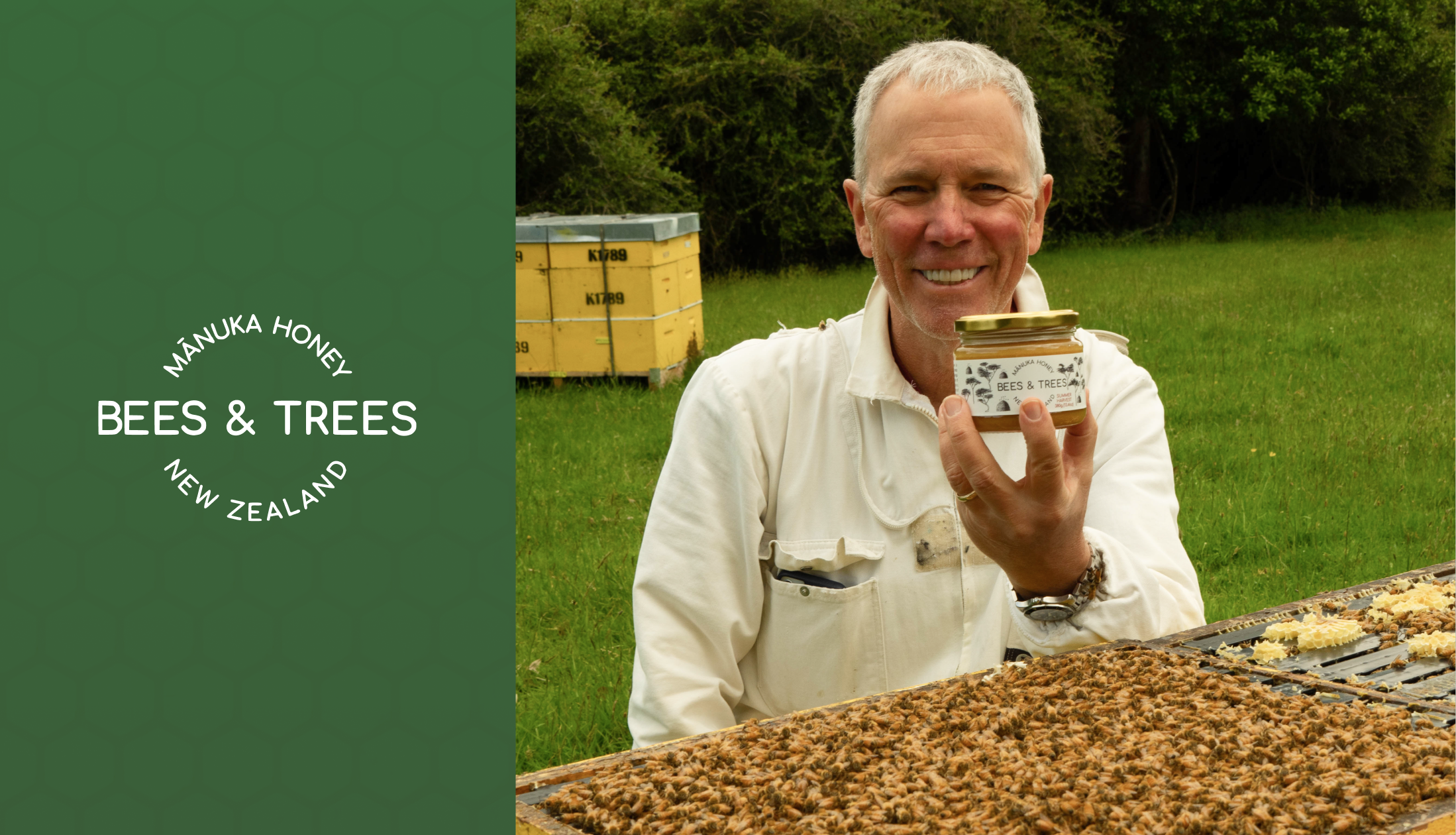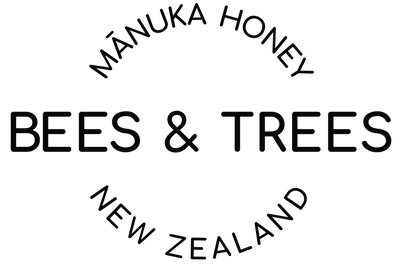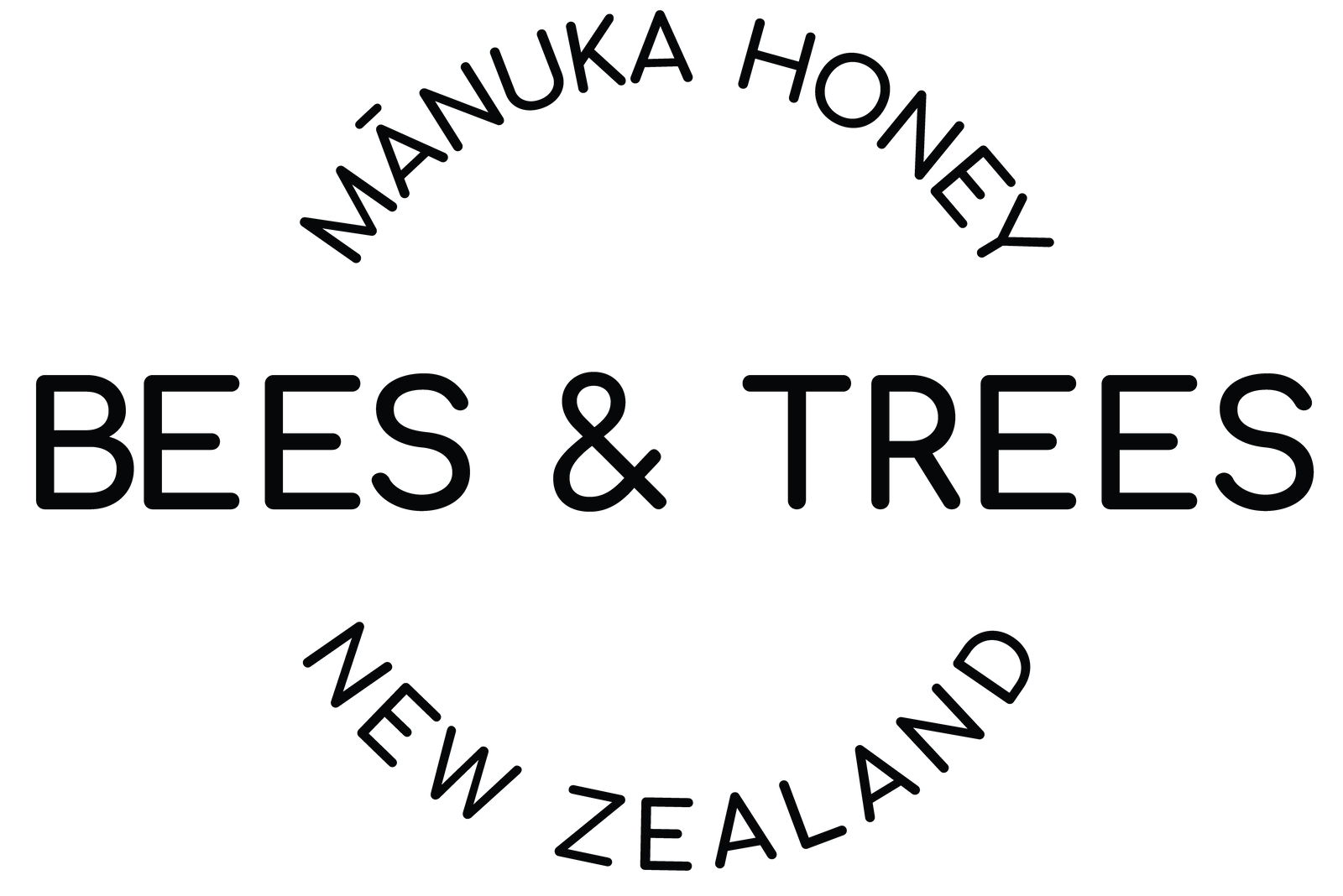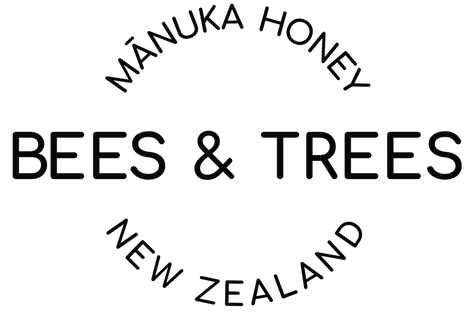In a candid conversation with Agebuzz Managing Editor Connie Zuckerman, Mike Everly, the founder of Bees & Trees, shares his remarkable journey from a career in management consulting to becoming a dedicated advocate for the health benefits of Manuka honey. Read through to the end of the interview to learn where Bees & Trees began, Mike’s vision, and future growth plans.
A Journey of Discovery
Connie Zuckerman: Mike, thank you so much for allowing us to share your personal story and for helping us educate Agebuzz readers about the health benefits of your product, New Zealand Manuka Honey!
Can you first give us some background about yourself?
Mike Everly: I’m 62 years old and was born in Amityville, New York (yes, home of the Amityville horror house, story for another day). I attended Georgia Tech in Atlanta, GA, and graduated in 1982 with a degree in Mechanical Engineering. I have one brother, and he and I were the first generation in our family to attend college. My Dad was a licensed projectionist at Kennedy Airport, servicing movie projectors for international flights. My mom worked in administration for a local hospital.
From Consulting to Beekeeping

Connie Zuckerman: Prior to starting Bees & Trees, what kind of work were you doing? Did it have any connection to your current company? When and why did you retire from your original career?
Mike Everly: Upon graduating from Georgia Tech, I was hired as a field engineer for Gearhart Industries, an oilfield service company. I was based in Lafayette, LA, offshore in the Gulf of Mexico, on oil drilling platforms. After two years, I moved to the role of Technical Operations manager, my first managerial role. I stayed for 4 years, transitioning in 1987 to a career in management consulting. My longest-running position was with Ernst & Young, starting as a staff consultant and becoming a partner in 1996. My work there included a focus on manufacturing operations, information systems, and ultimately on airlines, with projects for Delta Airlines, Air France, and Air New Zealand, where the seeds of my current career were unknowingly sown in 1998.
I left consulting in late 2000 and joined a longtime friend in Atlanta to head up a new property management company, to manage in-house projects for Novare Group Inc. Novare had a lot of success in the early 2000s, developing mixed-use high-rise condominiums. I thoroughly enjoyed the work and people at Novare, but something was pulling on my wife Shannon and me in the background.
Connie Zuckerman: What led you to New Zealand? What was it like living in such a different part of the world? What gave you the courage to pick up and move across the globe, and why did you then return to the US?
Mike Everly: In 1998, while consulting for E&Y, I was asked by our New Zealand affiliate to go to New Zealand to add airline industry expertise for the local office’s attempt to win a competitive project with Air New Zealand. We got the project, and my wife, our two-year-old son, and I spent 4 months in New Zealand. We enjoyed the people, places, and culture during that 4-month stay, living and working in Auckland, NZ’s largest city.
Upon returning home, we realized we had a deep-seated desire to get back to NZ at some point, when our children were a bit older, and spend a few years to give us all that experience. Our second child, Kate, was born in 1999, and we settled back into life in Atlanta. After changing careers in 2001 and starting with Novare, the urge to return to NZ fell to the back burner, but it kept coming back from time to time. Finally, in 2008, we put the wheels in motion to gain residency permits and move to New Zealand. While we had no specific plans for what type of work I would do there, we decided to just go for it and figure something out when we got there. We kept coming back to the idea that we had talked about this for so long, and if we didn’t try it, we’d look back later in life and regret not going.
We settled into the small community of Richmond, which is at the top of the South Island. Life there was a bit like turning the clock back on a simpler, quieter time in the US, or at least how we imagine it was. Our two children walked, scootered, or bicycled to school on their own, which speaks to the safety and smallness of the community. Our family became very outdoors-focused, with most family vacations involving at least some backpacking in New Zealand’s amazing wilderness places. We used each of the 4 school breaks during the year to explore different parts of New Zealand and really enjoyed that time as a family.
In 2012, when Bees & Trees was in its very early stages of growth, we moved back to the US for two reasons: Shannon and I both wanted to be closer to our parents. In my case, my mom was getting quite elderly and in need of support closer to home. We also felt we wanted to have our children finish high school in the US and be solidly on track for college here. That all worked out well as they both attended Georgia Tech, graduating with better grades than their dad.
Connie Zuckerman: How did you come to start Bees & Trees? What did you know about Manuka Honey prior to starting your company?
Mike Everly: We had set out with plans to be in New Zealand for 2-3 years. I wanted to work on something without being consumed by work, as was often my experience when consulting or when I was an executive in a fast-growing real estate company. I investigated several business opportunities to invest in or focus on. One of these investigations took me to the Taranaki region of the North Island to look at a native forest block as an investment for the sustainable harvesting of native timber.
While in this remote part of NZ for a few days, I observed the curious site of a helicopter flying beehives into a remote neighboring property. When I asked my host what that was about, I was told the beekeeper was going after Manuka honey, which was going to be the next really big thing due to its value in global markets. My next question was, how do you spell Manuka? After investigating Manuka trees, the honey, its properties, and uses, I decided to make a passive investment in some beehives with a company that would manage them on a cost share/crop share arrangement.
I was really attracted to the sustainability of the Manuka ecosystem since it was the Manuka trees that were spurring the re-establishment of the native forests in many areas of New Zealand, where land had been cleared for farming, but the farming proved to be marginal due to the terrain or remoteness of the areas.
Running Bees & Trees

Connie Zuckerman: Describe the company for us: How large? How do you produce your products? How do you manage a company that’s across the world?
Mike Everly: At that same time, we invested in the native forest block, which made me neighbors with several landowners who had lots of Manuka trees on their property. I started to strike agreements with my neighbors to use their land to produce honey. After two seasons, we terminated the management agreement, took possession of the hives, hired our first beekeeper, and began a 12-year journey to where the company is today. Today we manage between 1200-1500 hives and have 6 full-time employees in New Zealand. Our business is based in Stratford, a small farming community in the Taranaki region.
Our beekeepers care for our hives spread across the Taranaki region from March to December in sites we call “overwintering” sites. These are areas where we have ready access to the hives to monitor bee health, feed the bees, control the natural tendencies of hives to swarm in the spring, and generally do our beekeeping work. Each year in December or early January, our hives are moved into Manuka honey production sites in the remote eastern Taranaki hill country. This is a big, logistically complex operation that includes moves by truck overnight and lots of helicopter movements in the very early morning hours. Timing of these movements is critical to get the hives in position when the Manuka is starting to flower each year. During the season, we monitor the nectar flow with weight scales under sample hives, which send readings via satellite to our desktop. We also closely watch the weather, and 6-8 weeks later, we are making the decision to reverse the process. We move the hives to harvest sites, pull the Manuka honey off for extraction, put back some of the spring honey that we saved from their November non-manuka foraging, and begin the process of setting the hives up for winter.
The honey is extracted in our Stratford facility, stored in food-grade drums, and aged or matured for 12-24 months. Later, we’ll select batches based on lab test results on certain key chemical markers and have that honey packed in our jars and shipped to the US for sale.
Unveiling the Power of Manuka Honey

Connie Zuckerman: Let’s talk specifically about Manuka Honey: How is it different from other honey? Is New Zealand the only place it comes from? What are the health benefits that derive from using this honey? Are there scientific studies or other ways that these health benefits have been tested and verified?
Mike Everly: Manuka honey is truly one of nature’s most amazing products. It is the most heavily researched and studied honey in the world. A quick search on the National Institute of Health’s PubMed database using “manuka honey” returns more than 568 published scientific papers.
Manuka honey is most frequently studied and renowned for its antibacterial properties. Other properties include antiviral, anti-inflammatory, antiparasitic, and antifungal properties. It is antioxidant-rich and exhibits prebiotic properties as well. It is FDA-approved, and mainstream medically-embraced as a wound and burn care treatment. It is most often consumed for daily immunity support and overall wellness; used for symptom relief and to attack bacterial and viral infections associated with colds, flu, and COVID; and used to treat Acid Reflux / GERD and a host of digestive disorders.
Other common uses include use as a skincare agent for cleaner, healthier skin; and dental and oral care. Some of the more “out there” uses being explored include testing on various cancer cell lines and a novel approach to use Manuka honey sinus rinses as a way to mitigate upper respiratory infections before they can spread to the lower respiratory system for people living with Cystic Fibrosis.
As an interesting side note: A book was published in 2015 titled “Manuka: The Biography of an Extraordinary Honey” by Cliff Van Eaton. This book chronicles the early days of the discovery of these special properties in the 1990s and the growth of the worldwide interest in Manuka honey that ensued. It is a fascinating read.
Connie Zuckerman: Where can someone buy your honey if they live in the United States? Why is the cost so much higher than domestically produced honey?
Mike Everly: Our honey is available on our website. It is also available on Amazon, and we sell through a number of small, independent health and wellness stores across the US. You won’t find us in any of the large chain outlets, and this is by design.
Manuka honey is more expensive than other honey, partly due to the cost and challenges of producing it and partly because of supply and demand worldwide. It is much more of a wellness product that is used in multiple industries, and when considered in that light, the higher price starts to make a lot more sense.
Readers should be careful when shopping for Manuka honey to read and understand the lab testing, ratings, and labeling. Ensure you are getting Manuka honey with a Methylglyoxal (MG/MGO) level of at least 250 mg/kg. This is a naturally occurring organic compound that directly correlates with wellness and healing properties. We sell MG 350+, 550+, and 830+. There are lots of kinds of honey on grocery shelves in the US market that say Manuka honey but really contain mostly non-manuka fillers.
Looking Ahead
Connie Zuckerman: Do you work full-time on Bees & Trees? What’s it like being a small business owner and entrepreneur after retiring from your previous career? What do you see as the future of Bees & Trees? What are your ambitions for the company?
Mike Everly: There are two parts to our business. Our honey production company is based in New Zealand, and our retail company is based here in the US. A longtime friend, Shawn Seale, who lives in CT, invested with us a number of years ago. Shawn and I are business partners and work closely together on all aspects of the growth and development of our Bees & Trees retail brand. The business is very much family-owned and operated. Product ships from our two homes respectively, and our wives (and children at various times) actively help us. With our growth in recent years, we employ part-time help with packing orders and partner with marketing professionals to help us with our digital marketing efforts, attending trade shows, etc.
I’m working pretty much full-time right now, even more than I was 4-5 years ago. I travel to New Zealand 3-4 times per year, spending probably a total of 80-90 days per year in New Zealand, most of it during the NZ summer months engaged with our production operations. It is absolutely great to be an entrepreneur after working in a range of company environments in my earlier careers.
Our plans for the company right now are to grow sales to the point where we are selling 100% of our New Zealand production through our Bees & Trees brand here in the US. We are at about 50% currently, up from 10% 3-4 years ago. The difference historically was sold in bulk in New Zealand to other brands. On our current growth trajectory, we should achieve this goal in 2 more years. From there, we plan to grow production modestly, stay focused on quality, and selectively partner with other local beekeepers that we know and trust for additional honey supply.
Our vision for Bees & Trees is not to be the largest producer/seller of Manuka honey but simply the best in terms of quality, taste, customer service, etc. We are slowly but surely developing a very loyal customer base, and we want to continue to serve those customers with an amazing product.
Connie Zuckerman: What are the challenges and benefits of starting your own company later in life and being your own boss at this age?
Mike Everly: I’ve enjoyed many benefits of starting my own business later in life. I’ve always been a problem solver, and enjoy focusing my attention on the challenges of the business and coming up with creative solutions. Having such a diverse educational and professional background has enabled me to bring fresh thinking to a host of situations. I joke that as a consultant, you could have a good idea and then spend weeks or months convincing a client to try it in practice. As a business owner, I can have a good idea in the morning and have it implemented that afternoon.
Owning my own business brings a lot of flexibility, which I’ve exercised to varying degrees over the past 12 years to be able to spend more time with my family through various seasons of our children’s growth, my Mom’s aging and passing in 2014, and other life events. It has allowed me to go hard for periods of time, and back off to focus on family as I’ve wanted or needed to.
Connie Zuckerman: What future goals do you have for yourself? Do you ever see yourself retiring from Bees & Trees?
Mike Everly: I’m not sure I’m wired to be “retired.” I tend to be high-energy and creative and get a lot of enjoyment and satisfaction from learning new things and tackling new challenges. Having said that, there are lots of ideas I have and plans we are making about the next phase in our lives now that our children are grown and on their own. My wife and I have started to travel a bit more.
We’ve made two trips to Europe in the last 12 months, Spain and Italy. I am a bit of a hobbyist woodworker, having taken a few courses and always being handy with tools and building. One goal is to replace the shipping department in the basement (when we finally move to commercial space) with a fully equipped woodworking workshop. I’ve been accumulating timber slabs when trees in our yard or neighborhood have come down. I have a chainsaw with a milling guide for that purpose. My wife likes to say I’m not a woodworker, just a wood collector. Someday, I’m going to try to prove her wrong.
I’m continuing to enjoy being active in the business. I’m trying to start to spend a bit less time in New Zealand and lean more heavily on my General Manager, who oversees the operations there. Someday, we’ll face a decision about the future of Bees & Trees, but right now, that feels like it is 10 years plus into the future. When that day arrives, more than any other motivation, it is a strong desire to see what we’ve built up over the years be continued. Our regular customers rely on our products, and I want their ability to get really high-quality Manuka honey to outlast my involvement when it winds down eventually.
Connie Zuckerman: Anything else you’d like to share with Agebuzz readers about your background, company, or Manuka Honey?
Mike Everly: Just that Manuka honey really is an amazing product that everyone should know about. So take a bit of time to learn, make sure you are getting your money’s worth by understanding the labeling, and give it a try. For our family, I truly believe it helps us stay healthy and heal when we are sick. In that way, I think it can help anyone enhance their wellness and enjoy a better quality of life, especially as we age.
Connie Zuckerman: Mike, Thanks so much for sharing your story. Best of luck to you and Bees & Trees!
In the world of honey, Bees & Trees stands apart as a shining example of passion, dedication, and innovation. As our founder, Mike Everly, continues to steer the company towards new heights, one thing remains clear: he has an unwavering commitment to continue producing the best quality Manuka honey for you. Thank you for joining us on this journey. We value you!





